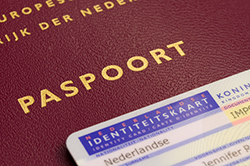Some new research published by Dutch researchers may make our US passport updates look like child’s play.
 Here in America, we’re due for a new passport in 2016. The State Department is making a number of changes that will help make new passports be more secure and less vulnerable to being forged or stolen and successfully used by criminals. However, some new research published by Dutch researchers may make our updates look like child’s play.
Here in America, we’re due for a new passport in 2016. The State Department is making a number of changes that will help make new passports be more secure and less vulnerable to being forged or stolen and successfully used by criminals. However, some new research published by Dutch researchers may make our updates look like child’s play.
According to a new article published last month in the scientific journal, Optica, P.W.H. Pinske and other researchers at the University of Twente in the Netherlands have come up with a new method for securing passports and other important identification cards. Oddly enough, the method involves quantum physics. Put simply, quantum physics is a field of science that studies the behavior of objects that are so small, the usual laws of physics don’t apply to them — objects like the particles that make up atoms.
Here is what Pinske is proposing (rather, this is what we think he’s proposing – it’s possible that this whole concept is going right over our heads): Pinske believes that we can paint a thin white strip of nanoparticles on new ID cards. A laser can then be used to burst tiny bundles of light into the strip, and the light will bounce around and burn a completely random pattern, a pattern that would be extremely hard – perhaps impossible — for a forger to mimic. In other words, Pinske wants to use quantum physics to create an advanced security strip that will keep almost anyone from creating a fake passport.
The only problem with Pinske’s nanoparticle strip is that thieves could still potentially steal your passport and use it. So, to stop that, Pinske suggests using both the nanoparticle strip and a biometric device. For example, when you get a new passport, the State Department could take a scan of your eyes or your fingerprints and code that into a chip on your passport. Then, whenever you travel anywhere, you’ll have to prove that you’re using your own passport by having your eyes or fingerprints scanned. If your scan doesn’t match the data in your passport, agents will know your passport is stolen. The idea is a bit big-brothery, but it’s not entirely out of the realm of possibility.
And just in case you’re worrying or wondering, chances are slim that this new research out of the Netherlands will have any effect on the USA’s 2016 passport plans.

